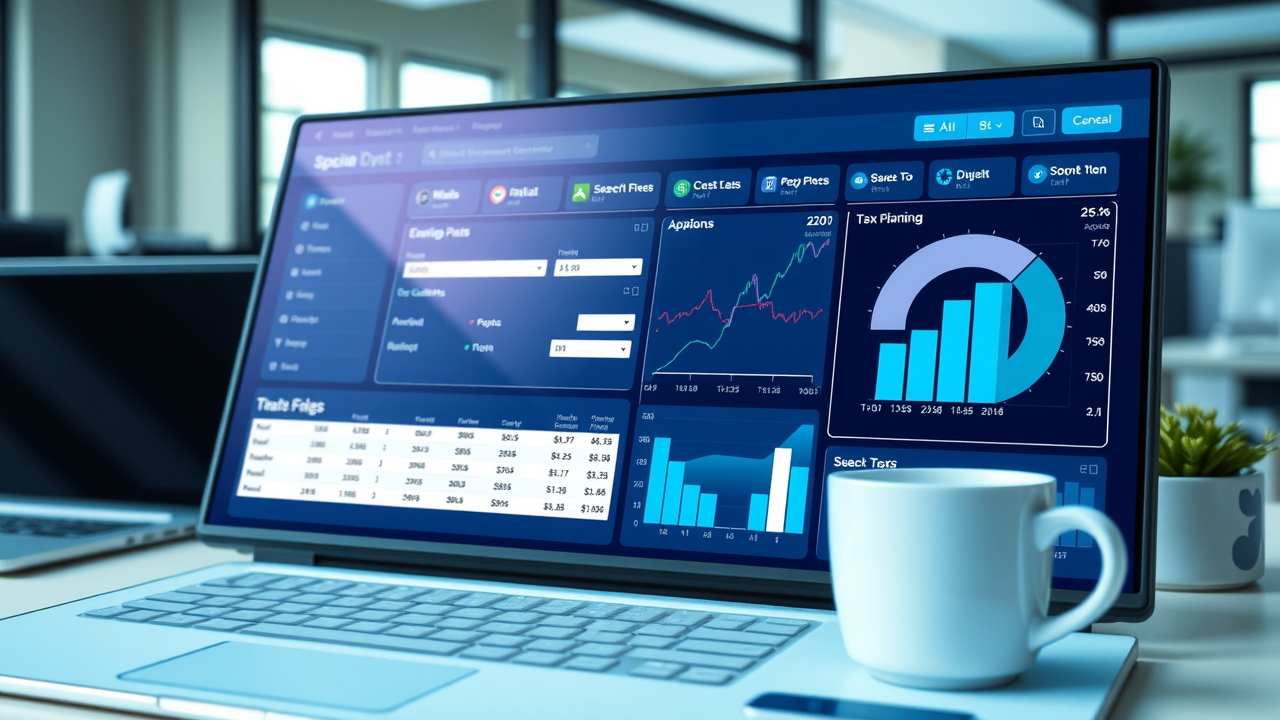Did you know? Over 60% of small business owners miss out on thousands in tax savings every year by not using effective business tax strategies. In today’s fiercely competitive environment, simply earning more isn’t enough—you need to keep more of what you make. The right business tax strategies can transform your bottom line, free up funds for growth, and shield you from costly compliance mistakes. This guide pulls back the curtain on proven tax methods, actionable tips, and expert insights, arming you with the knowledge to maximize every tax dollar.
-
What You’ll Learn:
-
Why most business owners overpay and how to avoid it
-
Steps to develop your winning tax plan
-
How to identify overlooked tax deductions and credits
-
Tactics for reducing your taxable income
-
When and how to partner with a tax professional
-

Why Most Business Owners Overpay: Surprising Facts About Business Tax Strategies
The harsh truth: most small business owners overpay their taxes, sometimes by thousands of dollars, simply by relying on outdated or incomplete business tax strategies. Critical factors include misunderstanding business expenses, not tracking income properly, or failing to plan throughout the tax year. When a business owner doesn’t actively embrace tax planning, they lose out on deductions, credits, and opportunities to lower their tax liability—all while risking noncompliance with ever-changing tax law.
For small businesses and sole proprietors, an ineffective tax plan means money left on the table. Studies show that less than half of business owners use year-round tax planning, even as major business tax rules evolve. Those missing out often fall into the common traps of mixing business and personal expenses, delaying document organization, or overlooking deduction eligibility. The cost isn’t just higher taxes—it’s reduced capital for growth, fewer resources for retirement planning, and increased audit risk.
“Over 60% of small business owners miss out on major tax deductions each year—costing them thousands.”

Maximizing Profits with Effective Business Tax Strategies
Business tax strategies are no longer just for accountants and tax professionals. Every business owner, from small businesses to growing medium-sized companies, can unlock significant savings with the right approach. By mastering the basics—like tracking business income and cataloging business expenses—you can set up a year-round tax plan tailored to your needs and avoid costly surprises.
Start by implementing essential business tax strategies :
-
Record and categorize every potential business expense to ensure nothing is missed.
-
Create a year-round calendar that includes deadlines for quarterly payments, tax document organization, and planning meetings with your tax pro.
-
Monitor frequent tax law updates that impact small businesses, such as deduction limits, withholdings, and available tax credits.
-
Use tax planning software to forecast tax liability and assess the impact of different business decisions before the end of the tax year.
Developing a comprehensive tax plan not only helps maximize legitimate deductions and business expenses but also allows you to leverage available business tax credits and minimize taxable income. Common missteps—like missing documentation or procrastinating until tax time—are easy to avoid once you embrace proactive business tax strategies.
Building Your Small Business Tax Plan: Key Concepts Every Business Owner Should Know
Tax Planning: Proactive Steps for Small Businesses
Tax planning is the backbone of effective business tax strategies. For small business owners, it means anticipating tax impacts before year-end—long before your tax return is due. Proactive planning means regularly reviewing income streams, business expenses, anticipated profits, and changes in your business structure. This perennial focus allows you to time large purchases, set up or contribute to a retirement plan, and maximize deductions for both ordinary and unique expenses.
For sole proprietors and LLCs, setting up a simple system to log receipts, categorize spending, and digitize records is vital to effective tax planning. Schedule quarterly reviews with your tax professional to track progress, make course corrections, and explore new business tax credits. Early action—like adjusting your estimated payments—can prevent year-end surprises, improve cash flow, and lower your tax liability for the next filing season.

Designing a Tax Plan that Minimizes Tax Liability
To keep your hard-earned money, you need a custom tax plan that matches your industry, entity type, and business income. The best plans combine tax-saving strategies with compliance—balancing risk and reward. Consider these tactics:
-
Analyze whether your current business structure (such as LLC, S Corp, or sole proprietorship) provides the lowest possible tax rate while maximizing flexibility.
-
Assess if taking advantage of bonus depreciation or Section 179 expensing for new equipment aligns with short- and long-term goals.
-
Factor in eligible retirement plan contributions—such as SEP IRA or Solo 401(k)—to both reward yourself and reduce your taxable income.
Engage your tax professional to simulate different outcomes for the tax year ahead. Adjust the plan throughout the year in response to changes—such as hiring employees, expanding locations, or taking on new partners. Continuous review, paired with automated tracking tools, ensures your tax plan stays aligned and legally compliant.
|
|
|
|
Comparative Overview of Common Business Tax Strategies for Small Business Owners |
|
Strategy |
Potential Savings |
Who Should Use |
Timing |
|---|---|---|---|
|
Retirement Plan Contributions |
Up to $66,000 per year (2024) |
Sole proprietors, LLCs, S Corps |
Ongoing, by tax year-end |
|
Bonus Depreciation |
100% cost deduction in year of purchase |
Businesses with new equipment |
When qualifying assets are purchased |
|
Entity Restructuring (e.g., S Corp Election) |
15%+ in payroll/self-employment tax savings |
Profitable small business owners |
Early in tax year |
|
Tracking Business Expenses |
Thousands from overlooked deductions |
All businesses |
Throughout tax year |
Identifying Deductible Business Expenses and Essential Tax Deductions
Understanding Business Expenses: What Qualifies & What Doesn’t
The IRS defines business expenses as "ordinary and necessary" costs related to running your business. That means everything from office supplies and business insurance to software subscriptions and vehicle expenses may be deductible, as long as you keep clear records. Understanding where the line is drawn is crucial: personal expenses, like family meals or non-business travel, are not deductible—even if you’re the business owner.
To ensure maximum savings, create systematic processes to track every expense. Maintain digital copies of receipts, use dedicated business credit cards, and match every transaction to its purpose. For mixed-use expenses—such as a home office or a business vehicle—calculate the percentage used for business to avoid IRS scrutiny and optimize your allowed tax deduction.

Unlocking Hidden Tax Deductions for Small Businesses
Many small business owners don’t realize how many opportunities exist for legitimate tax deductions. Beyond the basics (utilities, supplies, insurance), you can claim deductions for part of your rent or mortgage interest if you use a designated space in your home as an office. Don’t forget about health insurance premiums, professional development, ongoing education, and even depreciation for business assets.
Missing these deductions can cost small business thousands each year. By working with a tax professional or using up-to-date tax management software, you can routinely search for overlooked categories and stay compliant with shifting tax laws. Remember: “Every dollar properly tracked as a business expense translates into real savings on your tax return.”
Business Tax Credits 2024: Opportunities for Business Owners
The Most Valuable Tax Credits for Small Business Tax Reduction
While deductions reduce your taxable income, tax credits offer dollar-for-dollar reduction of your tax liability. The current tax year features a host of valuable credits for small businesses, including:
-
Research & Development Tax Credit
-
Work Opportunity Tax Credit (WOTC)
-
Family and Medical Leave Credit
-
Small Business Health Care Tax Credit

Comparing Tax Credits Versus Tax Deductions: What Gets You More?
Deciding between focusing on tax credits or tax deductions can be confusing. Here’s the key: tax deductions lower your taxable income (before tax is calculated), while credits subtract directly from what you owe. For example, a $1,000 deduction saves you around $220 if you’re in the 22% tax bracket, but a $1,000 credit reduces your tax bill by the full thousand.
|
|
|
|
Table: Business Tax Credits versus Deductions—Potential Savings Illustrated |
|
Scenario |
Tax Deduction |
Tax Credit |
Net Tax Savings (22% tax rate) |
|---|---|---|---|
|
Office Supplies |
$2,000 |
N/A |
$440 |
|
Hiring Credits (WOTC) |
N/A |
$2,000 |
$2,000 |
|
Health Insurance (Small Business Credit) |
$3,000 |
$1,500 |
$1,500 + $660 deduction = $2,160 |
Top Business Tax Strategies for Reducing Taxable Income
Leveraging Retirement Plans & Health Insurance as Tax Strategies
Retirement plan contributions—such as to a SEP IRA or Solo 401(k)—allow small business owners to both save for the future and immediately reduce their taxable income. For 2024, these contributions can reach as high as $66,000 (depending on income and plan type), offering one of the largest potential tax deductions available. Similarly, paying for your or your employees’ health insurance provides another substantial deduction—especially vital for sole proprietors and family businesses.
These strategies work best when planned before the close of the tax year. By setting up automatic contributions and consulting with your tax professional about qualifying plans, you ensure both compliance and optimal saving. Combine these with other deductions—like home office or equipment depreciation—to magnify your tax savings.
Exploring Bonus Depreciation and Accelerated Depreciation Tools
Bonus depreciation and Section 179 expensing allow businesses to write off the full cost of qualified asset purchases up front—rather than depreciating over several years. This is particularly powerful when your business expects a high-profit year, and you want to reduce tax liability quickly. If you acquire significant equipment, software, or even certain property, you can often claim 100% of their cost in the same year.
For 2024, the rules have shifted slightly, so always check with your tax pro for the current percentages and eligibility. Accelerated depreciation is especially useful for businesses expecting lower income in later years, as it “front-loads” the savings into the current tax year. Not all purchases qualify, so careful planning is necessary.
Structuring Your Business Entity to Minimize Tax Rate
Choosing the right entity (LLC, S Corp, C Corp, sole proprietorship) can dramatically alter your overall tax rate and liability. For example, electing S Corp status may allow high-earning business owners to pay themselves a reasonable salary and then take additional profits as distributions—lowering payroll taxes. Meanwhile, a C Corp structure comes with its own set of double-taxation risks and benefits.
Periodically review your business structure as your company grows. What worked as a sole proprietor may become suboptimal as revenue climbs or new partners join. Changing your entity type isn’t always simple—discuss options and timing with an experienced tax pro. Remember: “Strategic tax planning can shrink taxable income by 25% or more for many business owners.”
Tax Planning Tools and Technology for Small Business Owners
-
Top software and apps for business tax management: QuickBooks, Xero, FreshBooks, and Gusto provide expense tracking, document storage, and seamless links to your bank accounts.
-
Benefits of digital recordkeeping: Digitized documents are easier to search, less prone to loss, and simplify the process during tax season. Real-time tracking prevents missed deductions and supports compliance with tax laws.
-
Using online tax calculators: Tools like the IRS Tax Withholding Estimator or Intuit’s Tax Calculator help project your tax liability instantly, so you can adjust your tax plan ahead of time.

Expert Guidance: When Small Businesses Should Consult a Tax Pro
Key Times to Seek a Tax Professional for Business Tax Help
Navigating tax law, tax credits, and compliance requirements demands more expertise as your business matures. Consider consulting a tax pro when:
-
You’re forming a new entity or restructuring your business
-
Your income or business activities change significantly
-
You’re seeking advanced deductions or credits (e.g., R&D, health insurance, hiring green energy incentives)
-
You face an IRS audit or receive legal notices about your tax return
How to Choose the Right Tax Pro for Your Small Business
-
Credentials: Search for Certified Public Accountants (CPA) or Enrolled Agents (EA) as a baseline.
-
Questions to ask: What experience do you have with small businesses in my industry? Which tax planning strategies have benefited your other clients? How do you bill for services?
-
Cost vs. benefits: While hiring a pro incurs fees, the resulting savings from expert guidance usually outweigh the investment—especially if your company is scaling quickly.
Staying Compliant: Navigating Tax Laws and Preparing a Smart Tax Return

Critical Tax Law Updates for 2024 Affecting Small Business Tax
Every tax year, new regulations impact business tax strategies. For 2024, be aware of changes to bonus depreciation rates, eligibility for certain business tax credits, and adjusted deduction limits. Reviewing each update with your tax professional ensures you comply with all current rules and don’t leave money behind.
Failing to adjust your plans to new tax laws can mean missed opportunities or, worse, costly penalties. Always subscribe to IRS alerts, business journals, and software updates to stay informed on what applies to your unique situation as a small business owner.
Step-by-Step Checklist for Accurate Business Tax Return Filing
-
Catalog all business income, including payments received via digital platforms.
-
Reconcile expense accounts, ensuring no personal charges mix with business expenses.
-
Review available tax deductions and credits—run “what-if” scenarios using your tax software or with a tax pro.
-
Double-check entity info, EIN numbers, and signature lines for accuracy.
-
File on time (and electronically, if possible) to avoid penalties or slow refunds.
“Filing a compliant tax return is the foundation of a sustainable small business.”
Strategic Tax Planning for Business Owners Throughout the Year
-
Make quarterly tax payments based on forecasts of business income—using online calculators for accuracy
-
Track every business expense in real time with automated tools and regular reviews
-
Schedule tax plan reviews with your advisor before year-end to capture new deductions, credits, or law changes
Video Explainer: Year-Round Tax Planning Tactics for Small Business Owners
Watch practical tips on how to stay ahead with proactive tax planning every quarter, track business expenses efficiently, and avoid last-minute tax headaches.
Lessons From the Pros: Real-World Business Tax Strategies That Save Thousands
Case Study: Small Business Owner Turns Tax Obligations into Savings
Lisa, a freelance designer, grew her small business rapidly but paid high taxes every year—until she enlisted a tax professional and implemented a comprehensive tax plan. By setting up a SEP IRA, recording dedicated home office expenses, and leveraging accelerated depreciation for her design equipment, Lisa reduced her total tax liability by nearly $12,000 the first year. Year-round tracking with software pinpointed more deductible categories, translating to thousands in additional savings.
This story highlights the tangible value of regular review, diligent recordkeeping, and expert advice—key components of business tax strategies adopted by successful small business owners.

Mistakes to Avoid with Business Tax Strategies
Even the savviest business owners can fall into common traps. Here’s what to watch out for:
-
Forgetting quarterly estimated payments leads to penalties and cash flow hiccups.
-
Mixing personal and business expenses complicates audits and weakens deductions.
-
Overlooking new business tax credits means leaving free money on the table.
-
Ignoring changes in tax law makes your tax plan obsolete and increases audit risk.

People Also Ask: Key Questions on Business Tax Strategies
What are the most effective tax strategies for small businesses?
The most effective business tax strategies include maximizing qualified deductions, contributing to retirement plans, leveraging bonus depreciation, maintaining clear records, and taking full advantage of tax credits for which you qualify. Proactive tax planning throughout the year—rather than waiting until tax season—ensures your small business keeps more of its revenue and stays compliant with current tax laws.
How can business owners reduce taxable income legally?
Business owners can legally reduce their taxable income by contributing to retirement accounts, tracking all business expenses, depreciating business assets efficiently, and ensuring they claim all relevant deductions and credits. Consulting with a tax professional and updated tax planning software is key to navigating the rules and maximizing the efficiency of your tax plan.
Which business expenses are most often overlooked for a tax deduction?
Commonly overlooked business expenses include home office use, mileage or auto expenses, continuing education, subscriptions, business-related travel, and health insurance premiums. Scrutinize all expenses throughout the tax year and review IRS guidelines with your tax pro to capture every deduction to which your business is entitled.
Checklist for Implementing Smart Business Tax Strategies This Year
-
Catalog all potential business expenses
-
Regularly consult with a tax pro
-
Monitor tax law changes impacting small business
-
Review financial statements quarterly
Most Frequently Asked Questions about Business Tax Strategies
Which tax credits are available for new small businesses?
New small businesses may qualify for credits such as the Small Business Health Care Tax Credit, Work Opportunity Tax Credit, and in some states, technology or green energy credits. Always verify requirements and deadlines for each credit. Consulting with a tax professional ensures you maximize eligibility and avoid missing time-sensitive opportunities.

Can I deduct my home office if I’m a business owner?
Yes, if you use a portion of your home exclusively and regularly for business, you may qualify for the home office deduction. The allowed space must be your principal place of business or where you meet clients. You can deduct a portion of utilities, rent, mortgage interest, and insurance based on the office's square footage.
How do retirement plans reduce tax liability for business owners?
Retirement plan contributions (e.g., SEP IRA, Solo 401(k)) are deductible expenses that reduce taxable income directly. This not only lowers your immediate tax bill but also helps you build long-term savings. Higher contribution limits can mean thousands in tax savings each year for proactive small business owners.
When should I update my business tax plan?
Update your tax plan whenever there are major business events, such as hiring employees, acquiring assets, expanding locations, or new tax laws coming into effect. Additionally, make it a habit to review your tax plan with a professional at least once a year and when new IRS guidelines are announced.
Key Takeaways for Business Tax Strategies That Actually Save Money
-
Invest in professional tax planning for your business
-
Track all business expenses proactively
-
Stay compliant by keeping up-to-date with tax law
-
Maximize all available tax deductions and credits
Ready to Unlock Massive Tax Savings? Take Your Next Step Now
Don’t leave money on the table. Build your winning tax plan, embrace technology, partner with a tax professional, and start saving thousands today!
To further enhance your understanding of effective business tax strategies, consider exploring the following resources:
-
“7 Tax Planning Strategies for Your Small Business” : This article outlines key techniques such as managing the timing of income and expenses, maximizing depreciation, and utilizing the Qualified Business Income Deduction to reduce taxable income. ( smartasset.com )
-
“5 Tax Planning Strategies for Small Businesses” : This resource discusses strategies like setting up or contributing to retirement accounts, which can lower taxable income and provide long-term financial benefits. ( lendingtree.com )
By delving into these articles, you’ll gain actionable insights to implement tax-saving measures tailored to your business needs.
 Add Row
Add Row  Add
Add 




Write A Comment